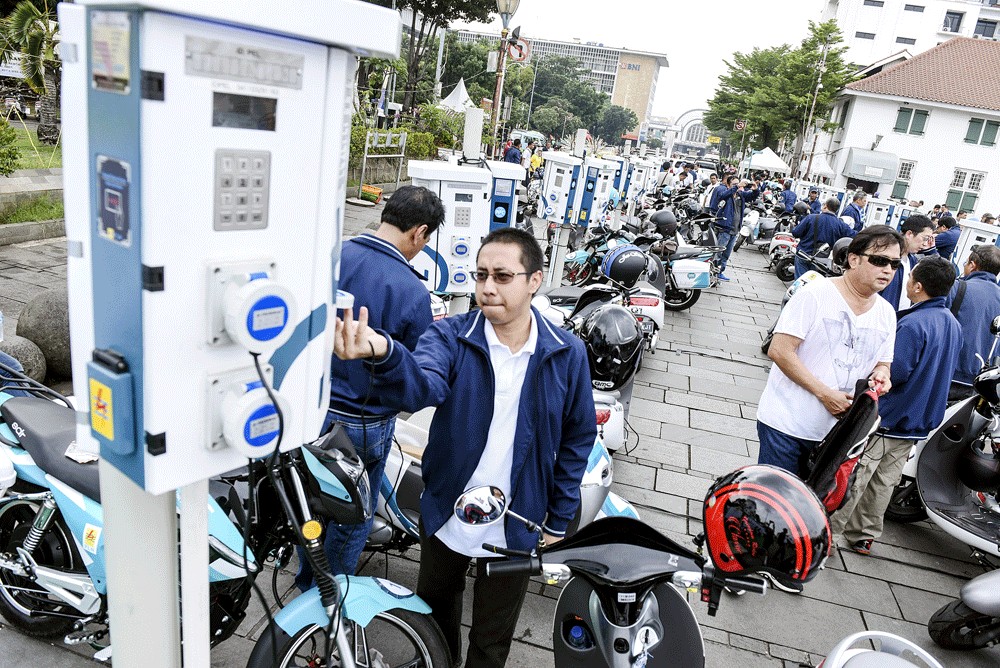Popular Reads
Top Results
Can't find what you're looking for?
View all search resultsPopular Reads
Top Results
Can't find what you're looking for?
View all search resultsPLN inks deal with carmakers, Grab to back EVs
The electricity company is looking to kill two birds with one deal: accelerate the adoption of electric vehicles in Indonesia while offloading its electricity generation overcapacity by developing more charging stations.
Change text size
Gift Premium Articles
to Anyone
P
LN has inked a cooperation agreement with auto brands Gesits, Hyundai and Wuling, as well as ride-hailing company Grab, in a push for the increased development of Indonesia’s electric vehicle (EVs) market.
PLN president director Zulkifli Zaini on Nov. 18 signed the state-owned electricity company’s agreement with the four companies to look at ways of ensuring easy electricity access for EV owners and operators.
The deal includes coming up with special electricity rates for nighttime EV charging at home and improving Charge.IN, the electricity company’s app that tracks public EV charging stations.
“In this case, we are talking about improving the ecosystem for EVs,” Zulkifli said during the virtual signing ceremony.
President director Ridzki Kramadibrata of PT Grab Teknologi Indonesia concurred: “The ecosystem, this is very important,” he said. Ridzki added that the company had over 5,000 EVs in its fleet, including recreational scooters, e-bikes for food deliveries and electric cars for transporting passengers.
The government is campaigning for wider EV adoption in the country to cut domestic fuel consumption and ease its dependence on imported fuel, as well as to revive the cooling automotive industry.
Statistics Indonesia (BPS) data shows that Indonesia imported US$1.08 billion in oil and gas in October, down 8 percent from the previous month and a much steeper 38.54 percent from October 2019, prior to the coronavirus pandemic.
Meanwhile, wholesale domestic sales reached around 421,000 vehicles in January to October this year, a 50.5 percent year-on-year (yoy) slump that was attributed to weakening purchasing power according to data from the Association of Indonesian Automotive Manufacturers (Gaikindo). Gaikindo slashed this year’s forecast for domestic car sales for the second time earlier this month to 525,000, from its previous forecast of 600,000.
A presidential regulation has been issued on developing the domestic EV industry, while a ministerial regulation has been issued that standardizes the specifications of EV charging stations toward this end.
According to PLN estimates, the volume of EVs in Indonesia is projected to grow 138-fold over the next 10 years to 73,500 units by 2030. Accommodating the influx in EVs will require expanding the number of charging stations by 40-fold to 7,146 stations by 2030.
For PLN, promoting EVs and installing new EV charging stations also means selling more electricity. The company’s cash flow is being strained by overcapacity at a power plant serving the Jawa-Bali region, which has prompted the company to seek out more channels for selling power.
The lack of EV charging stations is a key inhibitor of adopting the vehicles in Indonesia, according to a study by the Institute for Essential Services Reform (IESR). Meanwhile, transportation companies need PLN’s guarantee in supplying electricity for EVs in the industry.
The biggest obstacle, however, is one that is beyond PLN’s control: the high price of EVs compared to fossil fuel vehicles. Purchasing an electric car costs up to 3.5 times the price of a conventional car in a similar class.
“This tells customers that using EV is very easy,” PT Hyundai Motors Indonesia operations chief Makmur said on Nov. 18.
Hyundai Indonesia introduced its Ioniq and Kona EV models to the Indonesian market earlier in November. It also announced plans to build an EV manufacturing factory by 2022 in Cikarang, West Java, with an output volume of 250,000 EVs.
Makmur said that “around 100” Hyundai EVs were in the country so far. The company has begun installing new charging stations in Jakarta and Surabaya, as well as along the toll roads connecting the country’s two biggest cities.
The multinational automaker is shaping up to becoming the largest EV investor in Indonesia.
Meanwhile, PT Wika Industri Manufaktur, the company behind Indonesia’s only electric motorcycle, Gesits, has sold 1,870 motorcycles so far and aims to produce 2,800 motorcycles this year.
“Cheap and easily accessible electricity will attract people to switch from conventional to electric vehicles,” said Wika president director M. Saryanto.
Deputy president director Sun Zhonghao of PT SGMW Motor Indonesia, also called Wuling Motors, a wholly owned subsidiary of Chinese automaker SAIC-GM-Wuling (SGMW) Automotive Co. Ltd., said that the company was “entering the study phase” of EV sales and marketing in the country. This included looking into the availability of public charging stations and home charging facilities.
Wuling Motors in July launched its budget EV model, the Hong Guang Mini EV, for the Chinese market.










